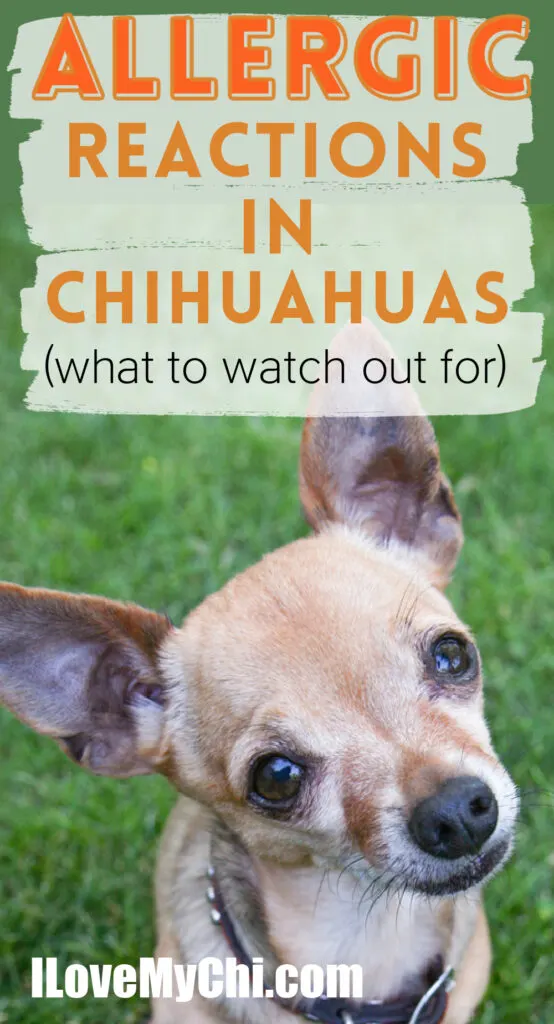Did you know that chihuahuas can suffer from allergic reactions just like humans do? I’m not talking about the sniffling and sneezing that comes with seasonal allergies, but instead severe allergic reactions.
A similar situation would be when a human has a peanut butter allergy and has an anaphylactic reaction. While the causes and presentation are different in dogs, they too can suffer from a life-threatening allergy.
This article is to inform Chihuahua owners on what to be on the lookout for if anaphylaxis was to occur!

Anaphylaxis
This is a severe hypersensitivity reaction that occurs almost immediately after contact with a foreign substance – called an allergen or antigen.
It can lead to minor or severe systemic illness and even death if left untreated.
What causes anaphylaxis?
For this type of reaction to occur, your chihuahua must have come in contact with the allergen in the past.
Usually, the first time they are exposed, you may not notice anything has happened, and most pets are fine. Your dog may have a minor reaction like swelling at the site or skin irritation.
After this exposure, the immune system becomes primed and sensitized to the allergen.
The next time your dog is exposed, the body is ready to go! Immune cells will recognize the allergen and go into overdrive. They will release histamine and other inflammatory chemicals causing a more severe allergic response.
In mild forms of anaphylaxis, swelling may occur in the area of exposure. Severe reactions will result in systemic signs of illness as the immune cells act in various areas of the body.

What type of allergens can cause anaphylaxis?
- Insect stings
- Vaccines
- Environmental allergens
- Medications
- Food proteins
What are some clinical signs of anaphylaxis?
Minor reactions:
- Hives, rashes, or itchy skin
- Nasal congestion or sneezing
- Mild localized swelling
Severe reactions:
- Facial swelling
- Vomiting and diarrhea
- Pale gums
- Weakness
- Collapse
- Shock
- Internal Bleeding
*Dogs are less likely to develop breathing changes as humans do.

How is it diagnosed?
Diagnosis requires a thorough medical history provided to your veterinarian. Many times, exposure is not witnessed so much of the diagnosis is through suspicion alongside clinical signs and labwork changes.
Your vet will likely take your dog’s blood pressure and look for elevations in their liver enzymes. Emergency practices that have access to ultrasound will look for evidence of swelling of the gallbladder wall and fluid in the abdomen.
What is the treatment?
Early recognition and emergency veterinary care are key! With severe reactions, your veterinarian will want to place an intravenous catheter and provide support with IV fluids. Additional medications can be given like antihistamines and corticosteroids to help stop the reaction. If the blood pressure is persistently low, medications like epinephrine may be given to help improve circulation. Your pet will be hospitalized for monitoring until they are stable.
Minor reactions rarely require hospitalization. Upon presentation, your veterinarian will likely administer a dose of an antihistamine like Benadryl and then keep your pet for observation for a short period. If clinical signs begin to improve, your pup will be sent home for monitoring with a short course of Benadryl.

Will my chihuahua recover?
For minor reactions, the prognosis is good. Most pets will be fine with a few days with an antihistamine.
For severe reactions, the prognosis is often guarded and depends on how your pet responds to treatment. Many dogs will recover, but even then, some may have longer-lasting complications like diarrhea, delayed emptying of the GI tract, arrhythmias, or pneumonia.
The longer your pet goes without treatment for anaphylaxis, the more likely they are to experience complications or even die. This is why it is so important to get them to a veterinarian ASAP.
It is important to remember that any dog experiencing anaphylaxis can suffer from the condition in the future. Keep them under a watchful eye and act quickly if you are ever concerned.


Cathy Bendzunas
Pet Blogger

Paula Simons
DVM
This article has been reviewed, fact-checked, and approved by Dr. Paula Simons DVM. You can read more about her on our About page.

